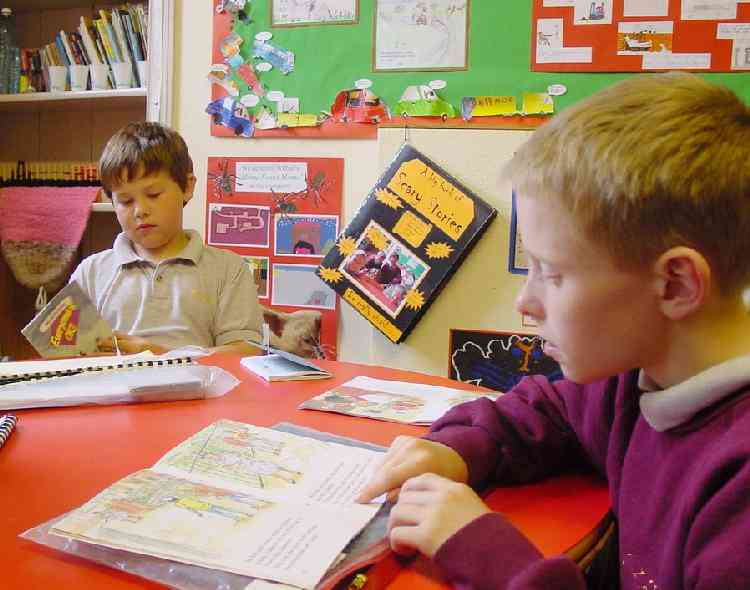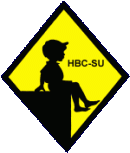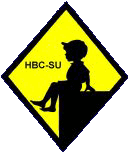
Figure 1.--One of the reasons that children in independent schools do better than children in the statec system is the standards of disipline in the classroom and the lack of toleration for disruptive behavior. |

|
Independent (private) education has been another major issue in English schools. England has one of the largest indepebndent sectors in the world. This was in part because of the low quality of many state schools. Social class was another factor, but countries like Germany and France also had strong class systems yet the state schools were so good that even affluent parents commonly sent their children to the state schools. Again the debate is tied up with the country class system and efforts to expand educational opportunity to working-class children.
The independent system today reports substantially higher academic results than the state system. This is clearly evident in the results of standardized tests. What is less clear is the degree to which this reflects the academic program or the varying social-class make up of the different schools. Unlike the grammar schools, it is not possible in a free society to abolish independent education. The Government did, however, in the 1970s and 80s end state programs supporting independent schools. One of the most impotant steps was ending the assisted places scheme. This debate has not ended. Policy makers now are reconsidering government policy toward uindependent schools.
Independent (private) education has been another major issue in English schools. Sociaklist reformers have seen independent education as an institution that has perpetuated class differences in Britain. They feel that private schools have given affluent children an unfair advantage. Ironically many of the same reformers championed the demise of the grammar school ans selective education which provide modest income families many of the advantges of more expensive independent eucation.
England has one of the largest indepebndent sectors in the world. This was in part because of the low quality of many state schools. England fell behind the United States, Germany, and several other countries in providing free state education. Prominent individuals questioned the idea of educating the masses. Social class was another factor, but countries like Germany and France also had strong class systems yet the state schools were so good that even affluent parents commonly sent their children to the state schools.
Again the debate is tied up with the country class system and efforts to expand educational opportunity to working-class children. The debate over independent and state education often gets muddled. This is in part because parents choose independent educatioin for a variety of reasons. Class prejudice was in the 19th and early 20th century a very important factor. Modern parents are more likely to focus on the higher standards uin the indepndent sector. Thus the debate is often confused and gets middled over cross pyrpses. Left wing critics commonly talk with the samne rectoric ofearly 20th century socialists while modern parents focus on the need to ensure that their child receives afirst class eucation. The critics of independent education commonly today question the standards that many middle-class parents find so important and are willing to make considerable sacrifices to obain for their children.
The independent system today reports substantially higher academic results than the state system. This is clearly evident in the results of standardized tests. What is less clear is the degree to which this reflects the academic program or the varying social-class make up of the different schools.
There is undeniably a class component to the education debate. In midern England it is less about class snobery than desipline issues. Middle-class and working-class parents tend to have differehtv attitudes both toward the value of education and descipling their children. These basic differences are aggrevated by the fact that middle-class parents are better educated and they have the financial resources to bettr care for their children abd prepare them for school. The result is that middle-class school begin school with a better basic academic preparation as well as the discipline needed to suceed in school. Working class children are less likely to know their letters and other basic preparation nor or they as prepared to sit still and follow teacher directions. Many middle-class parents thus want a school where their chilfren will not be slowed down by the lack of prepartion of other children, And again the left-wing reformers who often decry academic standards are also oprone to be less concerned anout discipline standards. We note a 2007 new report in wgghich an educator insisted that children who act out should not be punished, but rather rewarded to direct his behavior into more poisitive channeks.
Unlike the grammar schools, it is not possible in a free society to abolish independent education. The Government did, however, in the 1970s and 80s end state programs supporting independent schools. One of the most impotant steps was ending the assisted places scheme. This debate has not ended. Policy makers now are reconsidering government policy toward independent schools. Some see the independent system as a potential alernative in dealing with problem children. Otghers would like to remove the charitable status of the schools. There is a call that Independent schools in the UK prove
that they deserve their charitable status. Currently and going back to when
VAT (Value Added Tax) was introduced schools have been exempt from the tax
as they are classified as educational charities. Many independent schools do have totally
genuine and clear charitable status and purpose beyond simply offering an
educational service, however, a number of schools are financially very well
off and operate more as corporate institutions which has led some to start
querying whether they should automatically receive the tax beak.
Related Chronolgy Pages in the Boys' Historical Web Site
[Main Chronology Page]
[The 1880s]
[The 1930s]
[The 1940s]
[The 1950s]
[The 1960s]
[The 1970s]
[The 1980s]
Related Style Pages in the Boys' Historical Web Site
[Main school uniform page]
[Main country page]
[Long pants suits]
[Short pants suits]
[Socks]
[Eton suits]
[Jacket and trousers]
[Blazer
[School sandals]
Navigate the Boys' Historical Clothing School Uniform Pages
[Main School Uniform Page]
[Australia]
[England]
[France]
[Germany]
[Italy]
[Japan]
[Netherlands]
[New Zealand]
[Scotland]
[United States]
Navigate the Boys' Historical Clothing Web Page
[Return to the Main English school type standards page]
[Return to the Main English school types page]
[Introduction]
[Activities]
[Biographies]
[Clothing styles]
[Chronology]
[Countries]
[Bibliographies]
[Contributions]
[FAQs]
[Glossaries]
[Images]
[Registration]
[Tools]
[Boys' Clothing Home]
